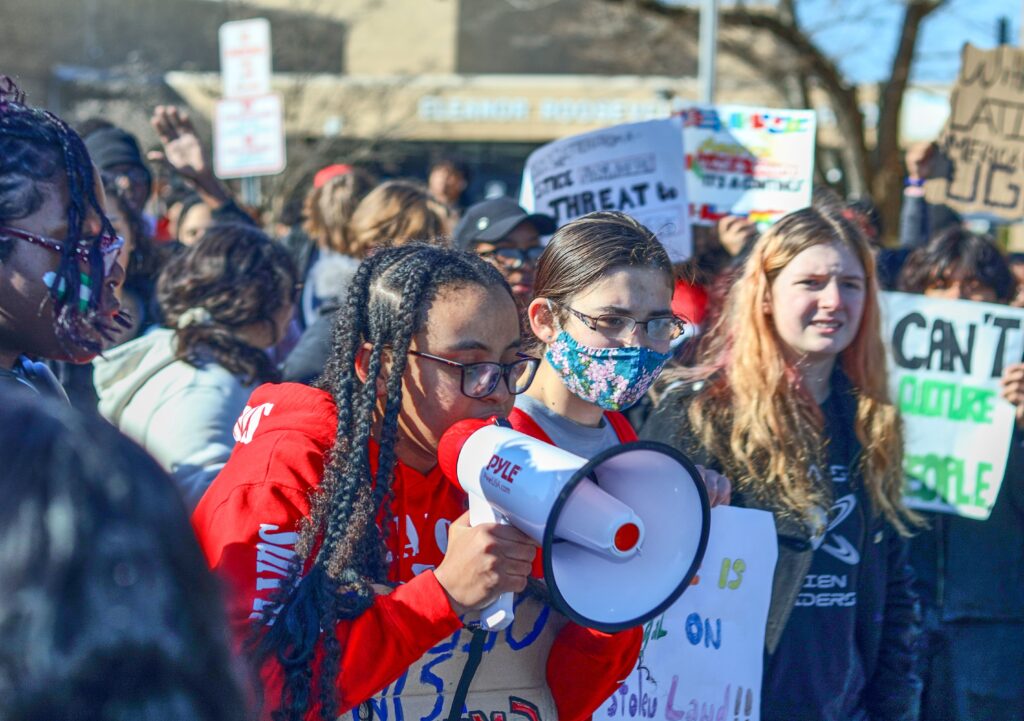At the start of the Monday, September 8 meeting of the Greenbelt City Council, during petitions and requests, Michael Canavan, a 39-year resident of Greenbelt and an employee of Public Works for five-and-a-half years, read a letter from Public Works employees. The letter requests a change to the city charter (section 3, paragraph 22) and city code (Chapter 13 “Labor Code”) to allow Public Works employees to collectively bargain, as city police officers are able to do. “We know our voices are stronger together, so we are joining together to form a union with LiUNA, Local 572,” states the letter by “We the Undersigned.” The letter is signed “Michael Canavan, Nate Rozier, Robbie Tripe, Dajuan Stanback and the majority of Greenbelt Public Works employees.”
Trent Leon-Lierman of LiUNA highlighted the 34 years of service to the Public Works department between three employees in attendance at the meeting. “A union will be good for the city, the residents and especially the workers,” said union organizer Leon-Lierman, who is also a resident of Greenbelt.
Frankie Santos Fritz, a resident who has also expressed his intent to run for city council in November, spoke in support of collective bargaining for the employees and wants the city to extend recognition and begin bargaining as soon as possible.
Resident Bill Orleans also spoke in favor of collective bargaining for all Greenbelt employees. Orleans said this is something that has been suggested to council for years. He cited two reports, one from the city’s Employee Relations Board (ERB) and one from the Community Relations Advisory Board (CRAB). “Council sat on those two reports for the last three or maybe four years now,” alleged Orleans, a characterization Mayor Emmett Jordan disagreed with.
The ERB submitted a report on collective bargaining in May 2021. That report concluded “the City provides rights to City nonmanagerial employees to organize into employee organizations, but specifically stops short of providing collective bargaining rights to employees other than police,” and stated, “We agree that employees should be able to collectively bargain, if the employees choose to exercise these rights.” In 2022, CRAB was tasked with the question “Should a collective bargaining agreement (CBA) be extended to non-police City staff?” CRAB found that Greenbelt employees are not covered by CBAs and “no other comparable municipalities employ CBAs for non-police.” CRAB did not provide recommendations to council on the matter after then-councilmember Colin Byrd withdrew his referral.
The signatories to the letter told the News Review there would be many more than the four names and three of them at the meeting if it wasn’t for fear of retaliation. “I think we’ll have a lot more people who will sign up to support this now that we’ve gone public,” said Canavan. “Especially amongst the Latino workers, a lot of them are just afraid. It’s a good idea but they don’t want to be associated with it, not in Trump’s America.”
Seeking Change
Leon-Lierman suggested one of the things Public Works employees who are solid waste workers would like to see change is the hourly-based employment system. A task-based system, which other cities have, says Leon-Lierman, allows employees to finish work after completing tasks rather than have additional tasks assigned.
Rozier said that the work they do as Public Works employees interfaces with other departments and results in the assignment of duties that might properly be part of another department, giving the example of trash service in the parks, which was once under Park Services. Additions to their workload and services don’t come with additional compensation and sometimes employees are informed only a week ahead of changes, says Rozier.
Public Works employees also want a voice in the budget, especially when there are potential looming cuts, says Leon-Lierman.
Sick Leave, Merit Pay
A large area of contention is merit pay. In Greenbelt there’s a two percent cost of living adjustment for city employees and a three percent merit-based pay, but the latter is subjective, says Leon-Lierman. Canavan says employees receive 13 days of sick leave but using over five can be held against them in their performance review. “It puts people in a really tough spot. If you’re sick and you need to stay home but you’re worried about losing one percent of your performance increase because you’ve used five days,” despite the fact they are entitled to 13, says Canavan. “You’re taking away half of our benefit.” Parents, especially, are put in tough situations, he says, explaining their dilemma as “Do I send my kids to school sick or stay home and risk my performance increase?” Others are in the “awful position” of wondering if they should come to work and potentially get coworkers sick, he says. Canavan believes holding over five sick days against employees is unfair. “If you ask they will kind of get into the weeds of, ‘Well it’s not an official policy but unofficially we can do this,’” he says of discussions with supervisors. “Fly-by-night policies is what I call them,” says Rozier, who has been a Public Works employee for 22 years. Stanback agreed that merit raises were an issue of concern. “No one should be denied merit raises for using sick leave, like has happened in the past,” he says. Stanback says he hasn’t seen the policy and “it’s not really on paper.” Canavan believes the policy began with a director three or four directors ago in response to an employee abusing their leave.
City Manager Josué Salmerón told the News Review that during his two-year tenure, a concern about sick leave and merit pay was first raised with him last week, on September 2, when he met with a labor organizer and a Public Works employee. The city’s Human Resource Director Dawane Martinez and City Clerk Bonita Anderson, who manage grievances for the ERB, report they have not received any grievances from Public Works employees regarding sick leave and merit pay.
“If they were taking care of the people, we wouldn’t be here, plain and simple,” says Canavan. Through this process of coming forward Canavan says he’s been asking himself, “If not me, who? If not now, when? Nothing happens until something moves.”
Council Action
At the end of the council meeting on Monday, shortly before council went into closed session, Councilmember Jenni Pompi proposed that staff begin working on a charter amendment to allow all nonmanagerial city staff to unionize. The motion was seconded by Councilmember Kristen Weaver. Councilmember Rodney Roberts said it was inappropriate to bring up such a motion at a meeting when residents hadn’t had notice or a chance to comment. Council always tells people they don’t act on petitions at that meeting, said Roberts, and should follow the normal process to be fair to all, he argued. After some discussion, Pompi amended the motion to direct staff to begin gathering information and start the process rather than draft language. Six councilmembers voted aye. None voted nay. Roberts had his hand over his mouth and did not move toward the microphone nor appear to vote either way. There was no call for abstentions.



